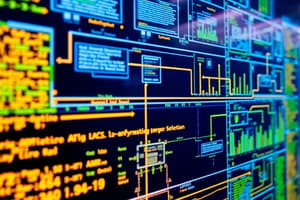Podcast
Questions and Answers
What is the primary function of Executive Support Systems (ESS)?
What is the primary function of Executive Support Systems (ESS)?
- To analyze day-to-day operational issues
- To improve employee productivity
- To assist senior management in making strategic decisions (correct)
- To handle routine transactions quickly
Which system is specifically designed to assist management in uncertain decision-making situations?
Which system is specifically designed to assist management in uncertain decision-making situations?
- Transaction Processing Systems
- Knowledge Management Systems
- Office Automation Systems
- Decision-Support Systems (correct)
What type of system is primarily used for processing routine transactions?
What type of system is primarily used for processing routine transactions?
- Knowledge Management Systems
- Executive Support Systems
- Transaction Processing Systems (correct)
- Decision-Support Systems
Which type of system focuses on improving the productivity of employees handling data?
Which type of system focuses on improving the productivity of employees handling data?
Which statement correctly describes Knowledge Management Systems (KMS)?
Which statement correctly describes Knowledge Management Systems (KMS)?
What is the primary purpose of a Management Information System (MIS)?
What is the primary purpose of a Management Information System (MIS)?
Which of the following is NOT one of the five main steps of management?
Which of the following is NOT one of the five main steps of management?
How is information different from data in the context of MIS?
How is information different from data in the context of MIS?
What best defines an Information System?
What best defines an Information System?
Which statement about the components of an Information System is correct?
Which statement about the components of an Information System is correct?
What role does Management Information Systems (MIS) play in organizational change?
What role does Management Information Systems (MIS) play in organizational change?
Which option describes the system's elements of an MIS?
Which option describes the system's elements of an MIS?
What is the significance of the 'Output' component in an Information System?
What is the significance of the 'Output' component in an Information System?
Flashcards
Management Information System (MIS)
Management Information System (MIS)
A system that gathers data, processes it, and produces reports to help managers make better decisions.
Executive Support Systems (ESS)
Executive Support Systems (ESS)
Focus on helping senior management make strategic decisions, often using data analysis and modeling to support these choices.
Decision-Support Systems (DSS)
Decision-Support Systems (DSS)
Designed to aid managers in situations where the outcomes are uncertain, providing tools to analyze options and make more informed decisions.
Knowledge Management Systems (KMS)
Knowledge Management Systems (KMS)
Signup and view all the flashcards
Transaction Processing Systems (TPS)
Transaction Processing Systems (TPS)
Signup and view all the flashcards
What is a Management Information System (MIS)?
What is a Management Information System (MIS)?
Signup and view all the flashcards
What are the five main steps of management?
What are the five main steps of management?
Signup and view all the flashcards
What is information in MIS?
What is information in MIS?
Signup and view all the flashcards
What is a system in MIS?
What is a system in MIS?
Signup and view all the flashcards
What is an Information System?
What is an Information System?
Signup and view all the flashcards
What is Information Technology?
What is Information Technology?
Signup and view all the flashcards
What are the components of an Information System?
What are the components of an Information System?
Signup and view all the flashcards
What is a Management Information System (MIS)?
What is a Management Information System (MIS)?
Signup and view all the flashcards
Study Notes
Management Information Systems (MIS)
- MIS is a computer-based system that transforms data into useful information for company departments.
- MIS tools help managers with decision-making, operations management, and evaluation of company departments.
Management
- Management involves efficiently using people and resources to accomplish company goals.
- Key management steps include planning, organizing, staffing, directing, and controlling.
Information
- Information is processed data used in planning, controlling, and operations within an MIS.
- Data is unorganized raw facts, observations, or messages, while information is its processed form.
- Information, unlike data, is often presented in a structured format providing insights and conclusions.
Information Systems (IS)
- An information system is a combination of people, hardware, software, networks, and data resources that collects, transforms, and spreads information within an organization.
- Information technology integrates computers and communications equipment to form information systems.
Components of an Information System
- Input includes hardware (e.g., computers), software (instructions), stored data (facts), personnel (operators), procedures, and communication networks.
- Output is the final product of a system's input and processing activities.
Management Information Systems (MIS) Categories
- Executive support systems (ESS) help senior managers make strategic decisions using data analysis and modeling.
- Decision support systems (DSS) assist managers in making decisions in uncertain situations.
- Knowledge management systems (KMS) promote information creation and sharing, particularly in knowledge-based companies.
- Transaction processing systems (TPS) handle routine transactions efficiently (e.g., payroll, billing).
- Office automation systems (OAS) improve employee productivity, often using software tools.
Why Use Management Information Systems?
- MIS helps companies handle threats, improve competitiveness, and drive organizational changes through strategic integration.
- Managers use information from MIS to compare actual performance to targets, identify problem areas, and explore new opportunities.
- Effective MIS improves decision-making which leads to enhanced performance and better outcomes.
Studying That Suits You
Use AI to generate personalized quizzes and flashcards to suit your learning preferences.
Related Documents
Description
This quiz covers the fundamentals of Management Information Systems (MIS) and their role in decision-making and operations management. It explores the key concepts of management, information processing, and the components of information systems. Test your knowledge on how MIS transforms data into actionable insights for organizations.




